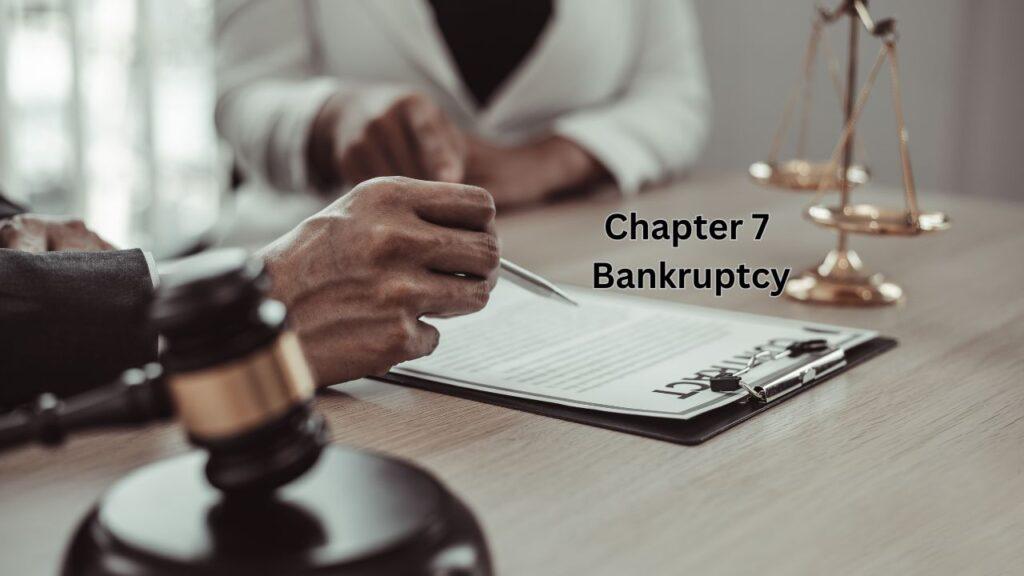If you are struggling with debt and looking for a way to get a fresh start, you may have heard of Chapter 7 Bankruptcy. Chapter 7 Bankruptcy is a legal process that allows individuals or businesses to liquidate their assets and discharge their debts. It also has some drawbacks, such as losing nonexempt property, affecting credit scores, and not eliminating certain debts. In this article, we will explain the eligibility, procedure, consequences, and alternatives of it, and help you decide whether it is the right option for you.
Eligibility for Chapter 7 Bankruptcy
To qualify for Chapter 7 bankruptcy, you must meet certain requirements and conditions.
First, you must pass the means test, which compares your income to the median income of your state. If your income is below the median, you can file for it.
If your income is above the median, you must deduct your allowed expenses from your income to see if you have enough disposable income to pay your debts.
You can file Chapter 7 bankruptcy if your disposable income is below a certain threshold. If your disposable income is above the threshold, you may have to file Chapter 13 bankruptcy instead.
Second, you must not have filed Chapter 7 bankruptcy in the past eight years or Chapter 13 bankruptcy in the past six years. You must also not have had a previous bankruptcy case dismissed in the past 180 days for reasons such as fraud, abuse, or failure to comply with court orders.
Third, you must complete a credit counseling course from an approved agency within 180 days before filing for it. You must also complete a debtor education course from an approved agency after filing for it. These courses are designed to help you understand your financial situation, budgeting, and alternatives to bankruptcy.
There are some exceptions and exemptions that may apply to certain debtors or situations. For example, if you are a disabled veteran who incurred your debts while on active duty, or if you are a debtor whose debts are primarily from operating a business, you may be exempt from the means test. If you are facing an emergency such as foreclosure or eviction, you may be able to file it without completing the credit counseling course first.
How to File Chapter 7 Bankruptcy
It is a legal process that lets you wipe out most of your debts by selling your assets. Here are the steps to file Chapter 7 bankruptcy:
Prepare and file a petition with the court. The petition has forms and schedules that show your assets, debts, income, expenses, exemptions, and other details. You also have to pay a fee of $338 (as of April 2021) or ask for a waiver or installment plan if you can’t afford it.
Work with a trustee. The court will assign a trustee to your case. The trustee will check your documents, sell your non-exempt assets (if any), pay your creditors (if any), and oversee the discharge of your debts (if any).
Stop creditor actions. Once you file Chapter 7 bankruptcy, an automatic stay will stop most creditors from collecting from you. They can’t sue you, garnish your wages, repossess your property, or contact you without the court’s permission. The automatic stay can help you avoid creditor harassment and lawsuits. However, some debts or actions are not stopped by the automatic stay, such as child support, alimony, tax debts, criminal fines, or eviction proceedings.
Attend a meeting of creditors. Within 21 to 40 days after filing for Chapter 7 bankruptcy, you have to go to a meeting of creditors. This is a hearing where the trustee and creditors can ask you questions about your finances and bankruptcy forms under oath. The meeting of creditors is usually short and informal, and most creditors don’t show up unless they have a problem or objection. You have to answer the questions honestly and cooperate with the trustee and creditors. The meeting of creditors verifies your eligibility and integrity for it.
Discharge your debts. This is the main benefit of Chapter 7 bankruptcy. It frees you from paying some debts within 60 to 90 days unless there is a problem. It applies to most unsecured debts, like credit cards, medical bills, personal loans, and utility bills. But some debts are not discharged, like student loans, taxes, alimony, child support, and fraud.
Consequences of Filing for Chapter 7 Bankruptcy
Filing it has a significant impact on your property, credit, and future finances. You should be aware of the following consequences before filing for Chapter 7 bankruptcy :
Property:
Filing Chapter 7 bankruptcy may result in losing some or all of your nonexempt property.
Nonexempt property is property that is not protected by bankruptcy law or state law from being sold by the trustee to pay your creditors. Nonexempt property may include cash, bank accounts, investments, vehicles, jewelry, art, collectibles, and other valuable items.
Exempt property is a property that is protected by bankruptcy law or state law from being sold by the trustee to pay creditors. Exempt property may include your home, car, clothing, household goods, retirement accounts, and other necessities.
The amount and type of exempt property vary by state and federal law. You can choose to use either the state or federal exemptions, depending on which one is more favorable to you.
Credit:
Filing Chapter 7 bankruptcy will affect your credit report and score negatively. A Chapter 7 bankruptcy will appear on your credit report for 10 years from the date of filing. A Chapter 7 bankruptcy will lower your credit score by about 200 points or more, depending on your previous credit history.
A low credit score will make it harder for you to obtain credit, loans, or mortgages in the future. It will also increase your interest rates and fees on any credit or loans that you obtain.
A low credit score may also affect your employment, insurance, housing, and other opportunities that require a credit check.
Future Finances:
Filing Chapter 7 bankruptcy will affect your future finances in several ways. First, you will lose any nonexempt property that you own or acquire within 180 days after filing for it. Second, you will not be able to file it again for eight years from the date of filing. Third, you will not be able to discharge any debts that you incur after filing it. Fourth, you will have to disclose your bankruptcy status to any potential creditors or lenders that you apply to in the future. Fifth, you will have to rebuild your credit and financial stability over time by making timely payments, using credit wisely, saving money, and budgeting carefully.
Alternatives of Chapter 7 Bankruptcy
Filing Chapter 7 bankruptcy is not the only option for dealing with debt. You should consider some of the alternatives and strategies that may help you avoid or reduce your debt without filing for Chapter 7 bankruptcy. Some of the alternatives and strategies are:
Negotiating with Creditors:
You may be able to negotiate with your creditors to lower your interest rates, waive fees, extend payment terms, settle for less than what you owe, or modify your loan agreements.
You can contact your creditors directly or hire a debt settlement company or a lawyer to negotiate on your behalf. Negotiating with creditors may help you reduce your debt and avoid bankruptcy.
However, negotiating with creditors may also have some drawbacks, such as damaging your credit, increasing your tax liability, exposing you to lawsuits, and costing you fees or charges.
Seeking Debt Relief Programs:
You may be able to seek help from various debt relief programs that offer counseling, education, management, consolidation, or forgiveness of your debt.
You can find reputable debt relief programs through nonprofit organizations, government agencies, or accredited institutions.
Debt relief programs may help you improve your financial situation and avoid bankruptcy. However, debt relief programs may also have some drawbacks, such as affecting your credit, requiring fees or charges, imposing restrictions or conditions, or being fraudulent or ineffective.
Filing Other Types of Bankruptcy:
You may be able to file other types of bankruptcy that are different from Chapter 7 bankruptcy.
The most common types of bankruptcy are Chapter 11 (business reorganization), Chapter 12 (family farmer or fisherman adjustment), and Chapter 13 (individual repayment plan). These types of bankruptcy allow you to keep some or all of your property and pay some or all of your debts over time through a court-approved plan.
These types of bankruptcy may help you resolve your debt and avoid liquidation. They may also have some drawbacks, such as being more expensive, complex, time-consuming, and restrictive than Chapter 7 bankruptcy.
Understanding Chapter 7 bankruptcy law is important for debtors who are facing financial difficulties or considering filing for bankruptcy. Chapter 7 bankruptcy law can help you get a fresh start financially, but it can also have some serious consequences on your property, credit, and future finances. Therefore, you should seek professional advice and guidance from a qualified bankruptcy attorney before filing Chapter 7 bankruptcy.






